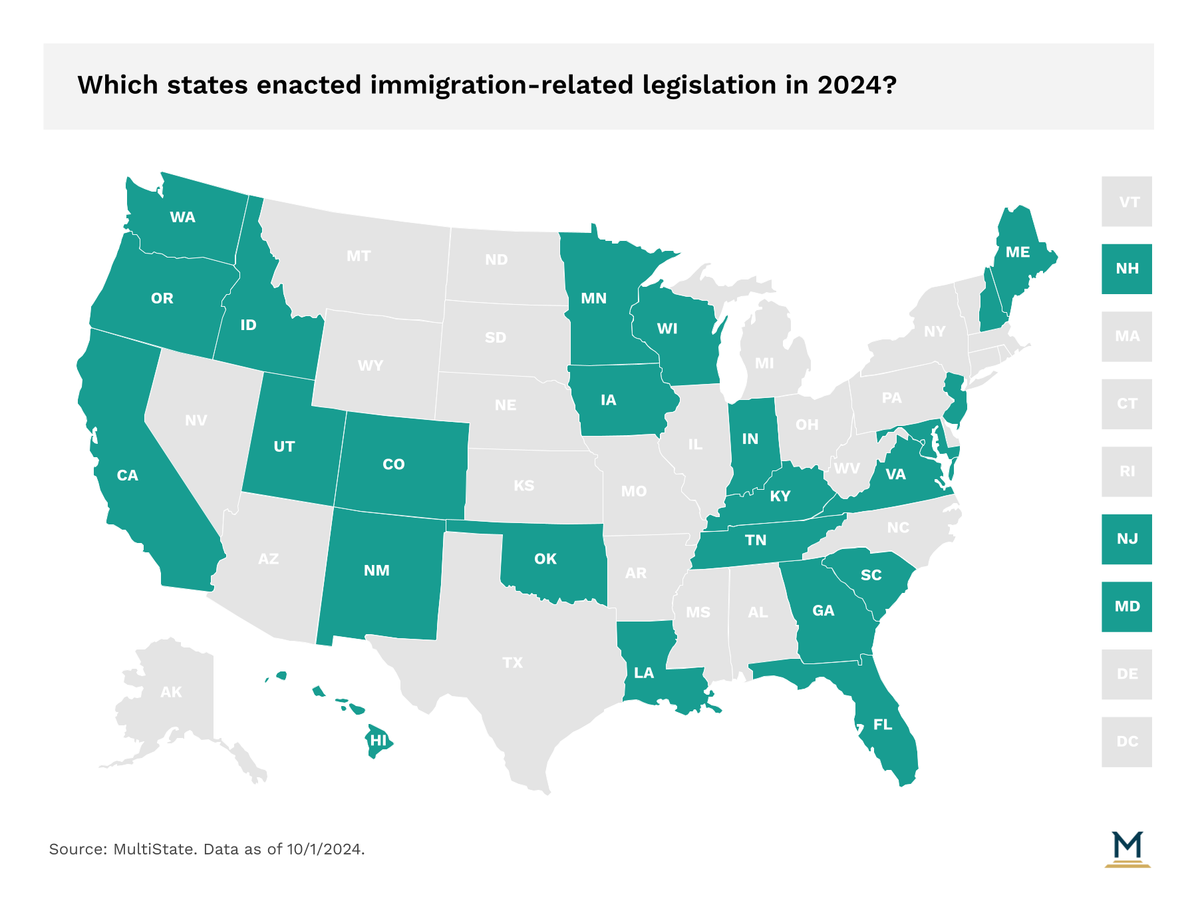
Legal
How State Lawmakers Regulated Marijuana, Hemp, and Kratom in 2025
February 5, 2026 | Kerrie Zabala, Michael Greene

Key Takeaways:
States enacted immigration legislation in 2024 that focused on employment, identification issues, public benefits, voting, and law enforcement. There were over 1200 immigration bills that were either introduced or carried over from 2023. States enacted immigration legislation in 24 states and of these, 10 had democratic trifectas, 11 had republican trifectas, and 3 had a divided government. While political party may determine the policy direction of these bills, Republicans and Democrats are equally active in this domain.

As expected, states with Republican leadership attempted to create stricter rules for immigrants, aiming to reverse policies that the Biden Administration has been advocating for on the federal level. States with Democratic leadership focused on increasing benefits for immigrants and making it easier for them to work and obtain identification.
Washington enacted several pro-immigration new laws relating to employment. WA HB 1889 allows individuals to receive professional licenses and certifications regardless of immigration or citizenship status. Colorado (CO SB 182) authorized the issuance of driver's licenses to individuals who are not legally present in the United States.
Iowa enacted IA SF 2340 to authorize police to make arrests based on immigration status. This law was based on language in TX SB 4, enacted late last year. Civil rights groups filed lawsuits to block this legislation in Iowa, saying it conflicts with federal law. In June, the legislation was temporarily blocked in federal court while the case is being litigated. Oklahoma enacted OK HB 4156 in April. This new law regulates entry into the United States and creates the crime of “impermissible occupation.” A federal court temporarily blocked the legislation because it conflicts with federal law. Florida Governor Ron DeSantis (R) signed FL HB 1451 into law in 2024. It will prohibit a county or a municipality from accepting identification cards or documents issued by anyone that knowingly issues identification cards to those not lawfully present in the United States. This is known as a “community ID” and cannot be used for voting or driving. These ID’s can be used as identification to be given to police or pharmacies.
States will no doubt be active on this topic in both red and blue states in 2025. There will likely be a significant number of bills relating to identification, benefits, public safety, and privacy in 2025. States vary widely in how they address immigration and how they regulate immigrants already living in the U.S. Expect to see more state legislation in 2025 that discusses sanctuary cities and local cooperation with ICE officials. Outside of enforcement issues, there will likely be a number of bills introduced concerning access to benefits like Medicaid or in-state college tuition. Employment issues like safety and pay standards and rules on obtaining driver’s licenses and identification cards will be issues to watch in 2025. Lastly, given the increased policy attention paid to privacy-related issues by state policymakers, we expect to see the privacy of immigration status also emerge as an area of debate amongst state legislators.
MultiState’s team is actively identifying and tracking this issue so that businesses and organizations have the information they need to navigate and effectively engage. If your organization would like to further track this or other related issues, please contact us.

February 5, 2026 | Kerrie Zabala, Michael Greene

February 4, 2026 | Sandy Dornsife

January 26, 2026 | Jason Phillips, Anthony Amatucci